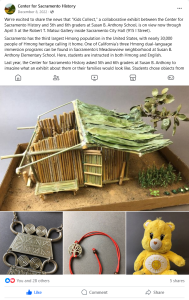
A couple of years ago, the Center for Sacramento History (CSH) introduced school kids to the world of archives and exhibit building through a program called Kids Collect. The archivists at the center showed inclusion and heart when they took the time to help Hmong children find or create artifacts reflecting their culture for an exhibit on display at city hall. Sacramento boasts the third largest Hmong population in the nation and CSH’s chosen school, Susan B. Anthony Elementary School, maintains a dual-language immersion program for their students (CSH, n.d.).

“Different styles of Hmong clothes can help people recognize who you are and what clan you belong to” – Madyson Vang, 5th grade (Sacramento City Express, 2023).
“To see Hmong traditional clothing and culturally significant artifacts be celebrated in Sacramento City Hall brings me such joy and pride for our community and our city,” said Vang, the City’s first Hmong-American council member. “I am especially proud of our Susan B. Anthony Elementary School students who put together such a powerful and inspirational exhibit. Their personal stories and experiences are truly empowering and representative of the immense diversity of our city. Understanding our past and learning about different cultures helps us build a better city where all communities can feel like they belong” (Sacramento City Express, 2023).
Fifth grader, Silvia Xiong described her grandmother’s red bracelet as an “artifact that represents me” (CSH, n.d.). Silvia felt included; she hopefully felt seen by a city and an information center she knew nothing about until those archivists showed up at her school.
The Society of American Archivists (SAA) encourages its members to “embrace the importance of identifying, preserving, and working with communities to actively document those whose voices have been overlooked or marginalized” (SAA, n.d.). The Hmong community in the United States is primarily here due to forced migration after the Vietnam War. Many Hmong are refugees or descended from refugees and are considered to have “greater health and mental health risks (e.g. hypertension, depression, etc.) and a higher poverty rate than any Asian population in the United States” (Im, 2021).
The CSH’s choice was no mistake. Those children were chosen for a reason. The center identified a marginalized community in Sacramento and welcomed them to share their stories with the entire city. Loida Garcia-Febo encouraged librarians to “embed humanity, compassion, empathy, awareness, and understanding” into their programs and this CSH outreach program embodied this call to action (2018). These archivists demonstrated to these kids and parents through heart-centered outreach that history is not just about a bunch of dead white guys. History is about themselves, their parents, grandparents, and cherished artifacts that they provided Sacramentans the privilege of seeing at city hall.
Christian Laursen argued in his keynote talk that libraries “should be leaders in promoting inclusion” (2018). I would wager that he would include archives in this endeavor as well!
References
Im, H. (2021). Falling through the cracks: Stress and coping in migration and resettlement among marginalized Hmong refugee families in the United States. Families in Society, 102(1), pp. 50–66. https://doi.org/10.1177/1044389420901393
Lauersen, C. (2018, June 7). Do you want to dance? Inclusion and belonging in libraries and beyond. The Library Lab. https://christianlauersen.net/2018/06/07/inclusion-and-belonging-in-libraries-and-beyond/
Sacramento City Express (2023, January 20). Sacramento City Hall exhibit focuses on elementary students’ Hmong heritage. Sacramento City Public Information Officer. https://sacramentocityexpress.com/2023/01/20/sacramento-city-hall-exhibit-focuses-on-elementary-students-hmong-heritage/
Society of American Archivists. https://www2.archivists.org/advocacy/diversity-and-inclusion-initiatives
@emmizo Absolutely – I think Christian would hold up archives just as he does libraries. Thanks for the informative post… great pictures!